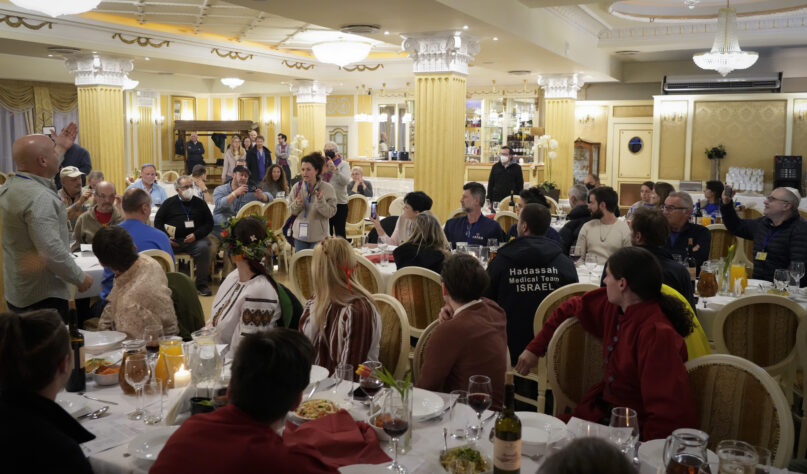I sat and talked with my friend Dave about his family’s Pesach. He told me about his father’s haggadah.
“I was thinking about how this is the tenth Pesach since my father’s death. We have a pile of haggadot that we use every year. You know, nothing special: the old Maxwell House haggadah. And then, I picked up a haggadah and opened it up. In its pages I found my father’s handwriting in pencil. It was the haggadah that he used to use when he led our seders when I was a kid. On the bottom of page 38, I saw this little notation: ‘Skip to p. 42.’
That was when I lost it.”
The story of Dave’s father’s haggadah is, on one level, the story of Judaism, written in miniature.
For it means that we inherit a text. To be an authentic Jew you must be an actor in a drama. You must be one who can say like the servant in the story of Job: I, only I, am left to tell the tale. For to us has been entrusted a tale, a vision, a dream — and to be a Jew is to tell the story.
On another level, it’s the story of Jewish renewal. Jewish history is always about finding and recovering the lost book. The scholar of Yiddish literature, David Roskies, once called the Jews “the people of the lost book.” We are those who constantly find and renew the past
On yet another level, the story of Dave’s father’s haggadah is about personal Jewish renewal. For the hidden book that we find contains pencil markings telling us which pages to skip.
Pay close attention. For each of us has inherited a book from the Jewish past. And in each edition of the book, there are pencil markings that say which pages to skip.
Translation: Some things are in our understanding of Judaism, and what it wants us to do, and some things are not.
We non-Orthodox Jews live with our own symbolic haggadot with pencil markings about which pages to skip – about the things we leave out of our Judaism.
But pay attention again: The notations that say “skip to page 42” are written not in ink. They are written in pencil, the great writing instrument of transience. The Hebrew word for pencil is iparon, from the Hebrew word afar, which means “dust.”
One generation comes and says that you can skip certain pages, skip certain rituals, skip certain meanings.
Another generation comes along and says that those instructions from the past are only in pencil.
It says: No, we do not skip this. And/or: that generation adds its own pencil markings for its generation, and says: In our time, our best understanding of what God wants says: Read this. Do this. And, yes, maybe skip to this.
And finally, the story of Dave’s father’s haggadah is about the story of our lives. As Pesach ends, as the yizkor service of memory looms, we realize that each of us has inherited a haggadah, a seder, a book of life from our loved ones whom we miss.
What is in the haggadah of their lives?
We remember them. But not the way they really were.
It is not only that Jewish historical memory, and ritual action, is selective.
It is also our own memories. The facts, if ever there were facts, become blurred over time. It is as if the ones we loved were themselves sacred texts, and that all we have now is memory and soul, midrash upon midrash, explanation upon explanation, seeking out the white spaces in between the letters. We, too, look at their lives and we see the penciled words: “Skip to p. 42.”
Which means: As I open the haggadah of your life, Mom, Dad, I stay and linger on certain pages, and I learn to skip certain things.
I skip over the pages that speak of the anger, and the fights, and the rebellion, and the meals in silence. Those pencil marks, they, too, are in pencil. Some years I will remember the stuff that I want to bury. But not now. Not now. No: now is the moment when I lift up all the holy moments, all the supernal moments, all the moments that are sacred and loving and which are in themselves redemptive.
For this is the truth: Each of us is a symbol of the Passover Seder.
- Each of us is carpas, growth and renewal.
- Each of us is haroset, bricks of sweetness and building.
- Each of us is salt water, tears, and sweat, anguish and ambition.
- Each of us is the zaroah, the shankbone of sacrifices made and offered and remembered.
- Each of us is maror, bitterness.
- Each of us is matzah, whole yet broken, broken yet whole.
- Each of us is a story: from degradation and failure to freedom.
- Each of us is many more questions that simply four.
- Each of us is many more children that simply four.
- Each of us is a moment of Dayennu: O, if only I could do just this, just that, it would be enough.
This is also the truth: Each of us must cross the waters and symbolically die to be re-born on the other side of the Sea of Reeds.
Each of us must cross the turbulent sea of conflicting memories and come to the other side. And then, we turn around and we see that the wilderness is still ahead of us, and that we have a long way to go, and that we will get there.






